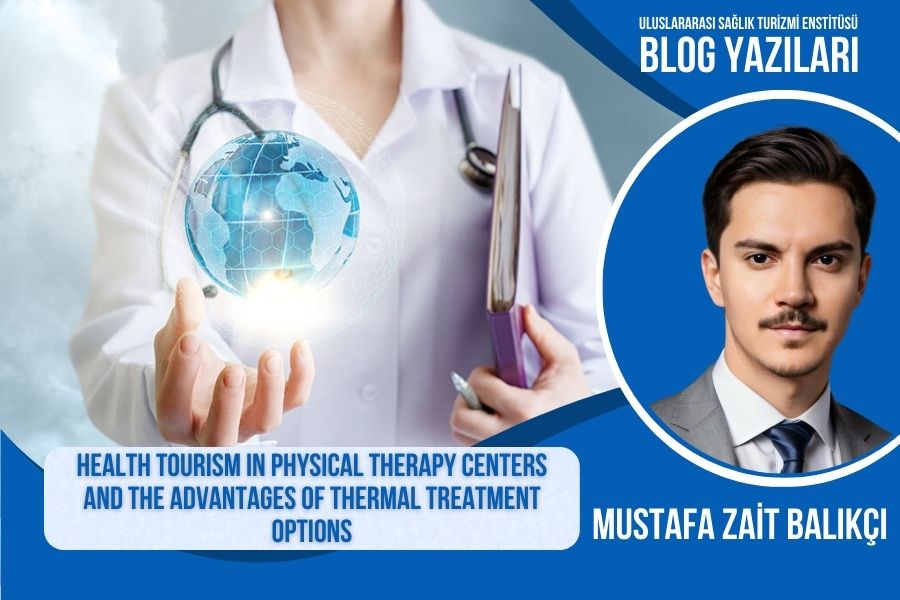Mustafa Zait BALIKÇI, m.zaitbalikci@gmail.com
Health tourism has gained significant momentum worldwide, with physical therapy centers playing a crucial role in attracting international patients. As the demand for holistic and non-invasive treatment methods rises, integrating thermal treatment options into physical therapy centers has proven to be a valuable addition. Pamukkale University Thermal Rehabilitation Center stands out as a prime example of how combining traditional physical therapy with thermal treatments can provide comprehensive and effective healthcare solutions. Health tourism involves individuals traveling abroad to seek medical treatment, rehabilitation, and wellness services. Physical therapy centers have become a preferred destination for health tourists due to their specialized rehabilitation programs that address various musculoskeletal, neurological, and orthopedic conditions. These centers offer personalized treatment plans that focus on enhancing mobility, reducing pain, and improving overall quality of life. Key factors driving health tourism in physical therapy centers include high-quality services at affordable prices, experienced medical professionals, advanced treatment modalities, and a holistic healing approach that enhances treatment outcomes.
Thermal therapy, also known as balneotherapy, involves the use of natural thermal waters to treat various health conditions. The integration of thermal treatment options into physical therapy centers presents numerous advantages, including pain relief and muscle relaxation, enhanced circulation and metabolism, reduction of inflammation, stress reduction and mental well-being, and improved skin health. Thermal waters are rich in minerals such as calcium, magnesium, and sulfur, which help alleviate pain and relax muscles, making them highly beneficial for patients with arthritis, fibromyalgia, and chronic pain disorders. The warmth of thermal water promotes blood circulation, improves oxygen supply to tissues, and enhances metabolic processes, contributing to faster recovery. Thermal baths have natural anti-inflammatory properties that help reduce swelling and stiffness in joints, making them an effective complementary therapy for rehabilitation. Thermal therapy provides a soothing and calming effect, reducing stress and anxiety levels, which play a crucial role in the overall rehabilitation process. Additionally, the minerals found in thermal water nourish the skin, helping to treat conditions such as psoriasis, eczema, and dermatitis.
Pamukkale University Thermal Rehabilitation Center, located just 3 km from the world-famous Pamukkale Travertines, is a pioneering institution offering a comprehensive range of physical therapy and rehabilitation services. The center combines evidence-based physiotherapy techniques with the healing properties of natural thermal waters, providing a holistic treatment experience for patients from around the world. It is equipped with modern physiotherapy equipment and hydrotherapy pools, comprising experienced physiotherapists, rehabilitation specialists, and medical professionals. The center offers tailored programs for patients with musculoskeletal, neurological, and orthopedic conditions, incorporating physiotherapy, hydrotherapy, and wellness programs for optimal results. Situated in the heart of Denizli, the center provides a tranquil environment conducive to healing and relaxation.
Thermal Water Analysis at Pamukkale University Thermal Rehabilitation Center
The thermal waters at the center have unique properties that set them apart from other thermal sources. With a temperature of 47.3°C and a balanced pH level of 6.74, the water offers an optimal therapeutic environment for various medical conditions. The high bicarbonate (995.0 mg/l) and sulfate (995.2 mg/l) content in the water contributes significantly to its healing properties. Bicarbonate aids in regulating the body’s pH levels and supports digestive health, while sulfate plays a crucial role in detoxification and improving skin conditions. The calcium content (456.0 mg/l) strengthens bones and supports muscle function, making it highly beneficial for patients with osteoporosis and musculoskeletal disorders. Magnesium (122.1 mg/l), another vital element, is known for its muscle-relaxing and anti-inflammatory properties, which help alleviate muscle spasms and promote relaxation.
Compared to other thermal waters, the unique composition of Pamukkale’s thermal water, with its rich mineral diversity and optimal temperature, provides a distinct advantage in the treatment of chronic conditions such as arthritis and fibromyalgia. The naturally occurring carbon dioxide content (183 mg/l) enhances circulation and promotes oxygen delivery to tissues, further boosting the therapeutic effects. Unlike other thermal waters that may have higher salinity or extreme temperatures, Pamukkale’s waters are gentle on the skin and suitable for long-term therapeutic use.
The integration of thermal treatment options into physical therapy centers is a game-changer in health tourism, offering natural, effective, and holistic healing solutions. Pamukkale University Thermal Rehabilitation Center exemplifies how combining cutting-edge physiotherapy with the therapeutic benefits of thermal waters can create an exceptional healthcare experience for patients seeking rehabilitation and wellness services. As health tourism continues to expand, such centers will play an increasingly vital role in catering to the needs of international patients.











